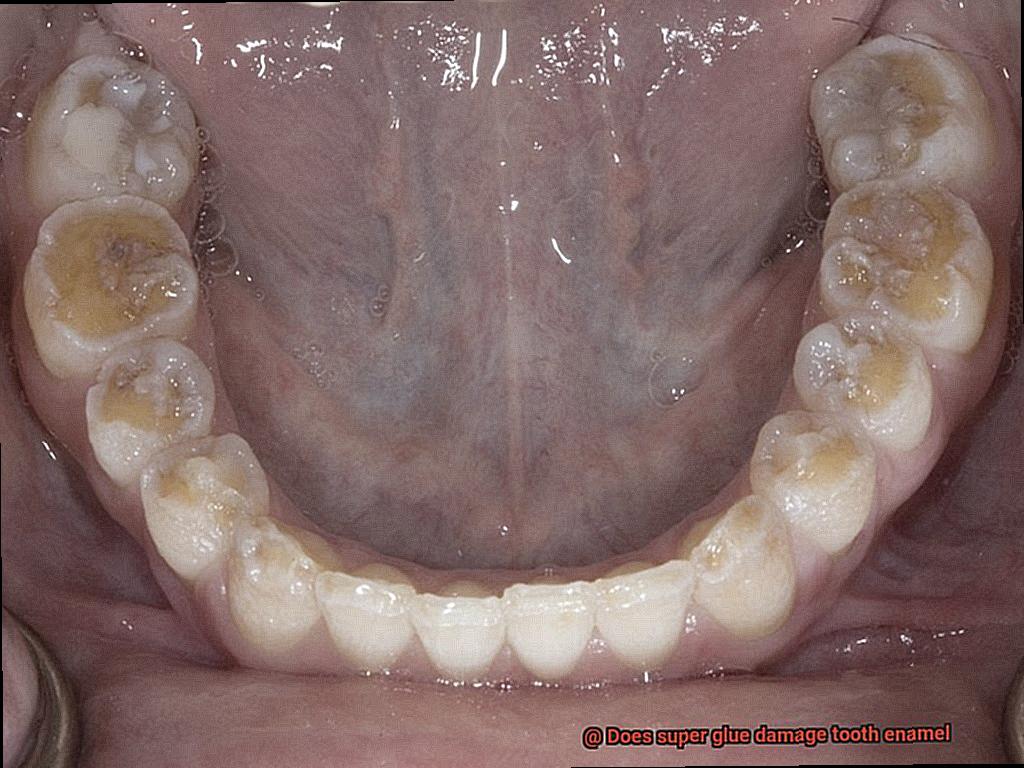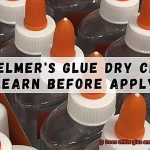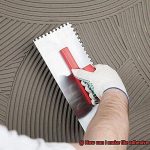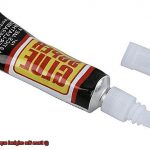Today, we’re diving into a topic that has everyone talking: does super glue wreak havoc on tooth enamel?
We’ve all been there – a dental mishap strikes, leaving us scrambling for quick fixes to save the day. And in moments of desperation, some folks turn to the infamous super glue as a temporary solution. But what are the real consequences? Is it a harmless hack or a potential dental disaster?
The mere thought of using super glue on our teeth might give us pause and raise concerns. However, this debate goes deeper than meets the eye. Join us as we explore scientific evidence, bust myths, and arm you with the knowledge you need to make informed decisions about your oral health.
So, grab your trusty dental floss and put on your curious hats – together, let’s uncover the truth behind super glue and tooth enamel.
What is Super Glue?
Contents
- 1 What is Super Glue?
- 2 What is Tooth Enamel?
- 3 How Does Super Glue Damage Tooth Enamel?
- 4 Dangers of Using Super Glue on Teeth
- 5 Removing Super Glue from Teeth
- 6 Professional Dental Assistance for Removing Super Glue
- 7 Preventing Damage to Tooth Enamel with Super Glue
- 8 Alternatives to Using Super Glue on Teeth and Dental Appliances
- 9 Conclusion
Super glue is a remarkable adhesive that can bond almost anything together in a matter of seconds. However, when it comes to our fragile tooth enamel, super glue can be a dental disaster waiting to happen. In this blog post, we will dive deeper into the world of super glue, exploring its composition, uses, and potential risks for our oral health.
Composition and Properties of Super Glue:
- Super glue, also known as cyanoacrylate adhesive, is a fast-acting adhesive that bonds quickly and strongly.
- It is made up of cyanoacrylate monomers, which react with moisture in the air to form a solid and durable bond.
- The adhesive has a very low viscosity, allowing it to flow easily and spread quickly for efficient bonding.
- One of the key features of super glue is its ability to bond surfaces together even in the presence of moisture.
Versatility and Uses of Super Glue:
- Super glue can bond a wide range of materials, including plastics, metals, ceramics, rubber, and even some fabrics.
- It is commonly used for household repairs, crafting projects, and even in medical settings for wound closure.
- The rapid curing time of super glue makes it convenient for small repairs or projects that require immediate use.
Risks and Dangers of Super Glue on Tooth Enamel:
- Tooth enamel is the protective shield of our teeth, safeguarding them from decay and sensitivity.
- Unfortunately, the chemicals present in super glue can erode and weaken the enamel.
- These substances dissolve the minerals in the enamel, making it vulnerable to damage and potential dental problems.
- Additionally, super glue lacks biocompatibility and can cause irritation or allergic reactions when in contact with oral tissues.
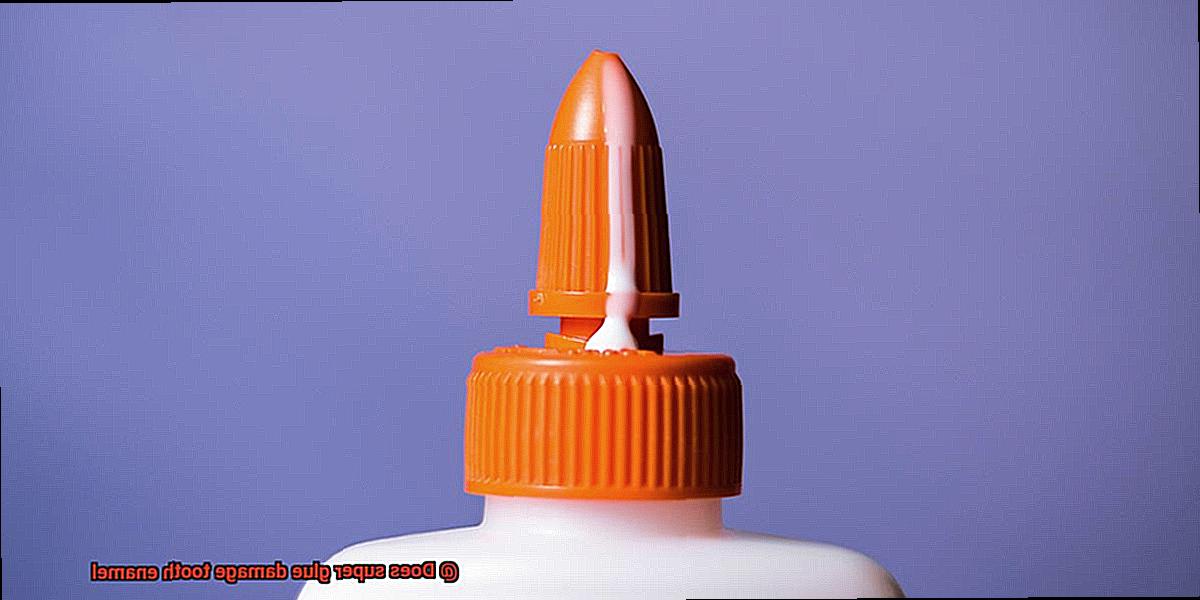
Handling Accidental Contact with Teeth:
- If super glue accidentally comes into contact with your teeth, it is crucial to act swiftly.
- Gently brush the affected area with a soft toothbrush and rinse with water to remove any residue.
- However, if the glue has dried and hardened, attempting to remove it yourself can lead to unintentional scraping or scratching of the enamel.
- Seeking professional dental assistance is essential for safe removal without further damaging the enamel.
Prevention and Professional Help:
- To protect your tooth enamel, exercise caution when using super glue near your mouth.
- Be mindful of accidental contact with your teeth and gums.
- If you need to repair a dental appliance or restoration, consult a dental professional who can use adhesives specifically designed for oral use.
What is Tooth Enamel?
Prepare for an exhilarating journey into the enchanting world of teeth, as we uncover the mysteries surrounding one of its unsung heroes. Get ready to be amazed by the wondrous tooth enamel – the valiant guardian of our pearly whites.
Let’s begin with the essentials. Tooth enamel, like an impenetrable fortress, is the resilient outer layer that shields our teeth from wicked villains lurking within our mouths. It acts as a superhero cape, defending against bacteria, acids, and other malevolent substances that can lead to cavities and sensitivity. Imagine it as a shield, protecting your teeth from harm.
So, what exactly is this formidable enamel made of? Brace yourself for a thrilling science lesson. Enamel primarily consists of minerals, particularly hydroxyapatite crystals. These magnificent crystals endow enamel with extraordinary strength and durability, making it the hardest substance in our entire bodies. Move aside, Wolverine.
However, even superheroes have their vulnerabilities. Enamel can be damaged by poor oral hygiene, acid erosion, teeth grinding (enter the villainous bruxism), and traumatic incidents. And here’s the sting: once enamel is harmed, it cannot regenerate or repair itself like other tissues in our bodies. Ouch.
Now, let’s explore how we can become protectors of our enamel fortress. Good oral hygiene practices are crucial. Brush your teeth twice a day with fluoride toothpaste (your trusty sidekick in the fight against cavities), floss daily to defeat those sneaky plaque particles, and visit your dentist regularly for check-ups and cleanings (they possess X-ray vision to detect any impending threats.).
To safeguard your enamel from acid attacks, aim to limit acidic foods and drinks in your diet. And remember, sugary snacks are like kryptonite for enamel, so consume them in moderation. Oh, and choose a soft-bristled toothbrush – no need to unleash your inner Hulk on your teeth.
In a world where tooth decay and sensitivity run rampant, tooth enamel remains our unsung hero, silently safeguarding our teeth day in and day out. Let’s shower our enamel with love and care it deserves. Maintain your oral hygiene routine, avoid harmful habits, and together, we can ensure the longevity and well-being of our radiant smiles.
How Does Super Glue Damage Tooth Enamel?
Today, we embark on an intriguing journey into the secret world of tooth enamel and its epic battle against an unexpected foe – super glue. Join me as we unravel the mysteries surrounding this dental conundrum and discover how this seemingly innocent adhesive can wreak havoc on our precious enamel.
The Chemical Reaction:
Super glue, also known as cyanoacrylate adhesive, is a powerful bonding agent used in various applications. However, when it comes into contact with tooth enamel, it can lead to significant damage. The primary ingredient in super glue, cyanoacrylate, reacts with moisture to create a strong bond. Unfortunately, this reaction can break down the minerals in enamel, causing erosion and weakening of the tooth structure.
The Rough Surface Effect:
In addition to eroding enamel, super glue can also create a rough surface on the tooth. This rough texture becomes a breeding ground for bacteria, leading to plaque buildup and potential tooth decay. Think of it as creating tiny crevices where bacteria love to hide and wreak havoc.
The Acidic Assault:
To make matters worse, super glue contains acidic components that further contribute to enamel damage. Acidic substances have the ability to soften and dissolve tooth enamel over time. When super glue comes into contact with saliva or oral fluids, it releases acidic byproducts that gradually wear away the enamel.
Prevention and Treatment:
Preventing super glue from damaging tooth enamel starts with taking precautions while using it. Wearing gloves and masks can minimize accidental exposure. However, accidents happen, and if super glue does come into contact with your teeth, seek immediate dental attention. A dentist can assess the extent of the damage and recommend appropriate treatment options to prevent further complications.
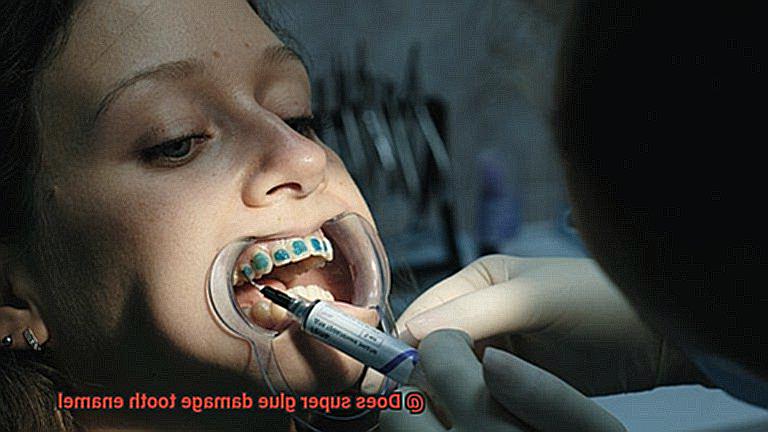
Dangers of Using Super Glue on Teeth
Picture this: you’re at home, and disaster strikes. Your tooth cracks or a filling falls out, leaving you in a panic. Desperate for a quick fix, you reach for the nearest tube of super glue, thinking it will save the day. But hold on there, my friend. Before you embark on this dental DIY adventure, let me enlighten you about the dangers that lurk beneath the surface.
Super glue may be a superhero when it comes to fixing broken items or bonding materials together, but it’s definitely not cut out for teeth duty. Why, you ask? Well, let’s dive into the treacherous world of dental dangers and discover why this seemingly harmless adhesive can wreak havoc on your pearly whites.
- Toxicity: First and foremost, super glue is toxic. It contains chemicals that are not meant to be ingested or applied directly to your body. When you apply it to your teeth, these chemicals can cause chemical burns and irritation to your gums, tongue, and even your tooth enamel. Ouch.
- Enamel Erosion: Speaking of enamel, that protective shield guarding your teeth from the evil forces of decay and damage – well, super glue has a knack for breaking it down. The chemicals in super glue erode and weaken enamel over time, leaving your teeth vulnerable to cavities and other dental nightmares.
- Obstacles to Proper Care: But wait, there’s more. Super glue can also make it difficult for dentists to perform necessary dental procedures or repairs in the future. That hardened super glue creates obstacles that hinder proper dental care, potentially leading to even more serious oral health issues down the line. Trust me; you don’t want to face those consequences.
So, what’s the bottom line? Using super glue on your teeth is a big no-no. Instead of taking matters into your own hands, it’s vital to seek professional dental care from a qualified dentist. They have the knowledge, skills, and proper materials to provide appropriate treatment options and ensure your teeth stay healthy and happy.
Removing Super Glue from Teeth
- Imagine this: you’re in the middle of a DIY project, and in a moment of haste, you accidentally get super glue on your teeth. Panic sets in as you try to figure out how to remove this sticky mess. But fear not. I’m here to guide you through this challenging situation with safe and effective methods for removing super glue from your teeth.
- Let’s start by debunking a common myth: super glue won’t dissolve your tooth enamel. Your enamel is incredibly resilient, so you don’t need to worry about any long-term damage. However, getting that super glue off your teeth can be quite the task.
Here are some tried and true methods to help you remove super glue from your teeth:
- Gentle scraping: This technique should only be performed by a dental professional. Using a special dental instrument, they’ll carefully scrape off the super glue without causing any harm to your teeth or gums.
- Warm water soak: Soaking the affected area in warm water can soften the super glue, making it easier to remove. Avoid using hot water, as it may potentially harm your oral tissues.
- Dental floss or tape: Gently pulling dental floss or tape between your teeth might dislodge those stubborn super glue particles.
- Dental adhesive remover: In some cases, a dental adhesive remover may be necessary to effectively dissolve the super glue. These products are specifically designed to remove adhesives without causing any damage.
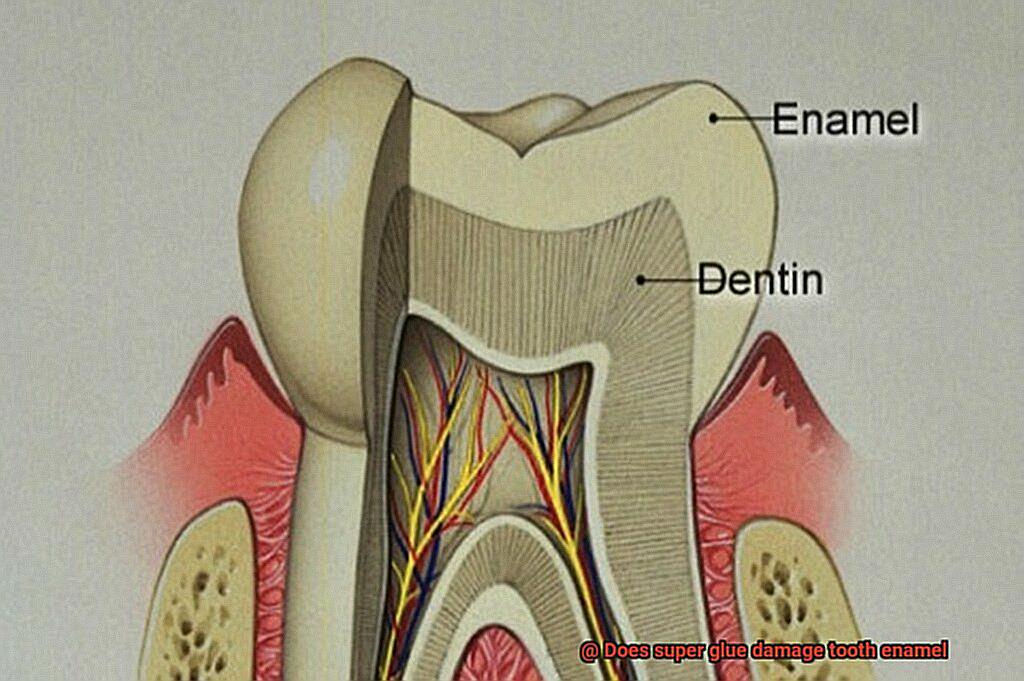
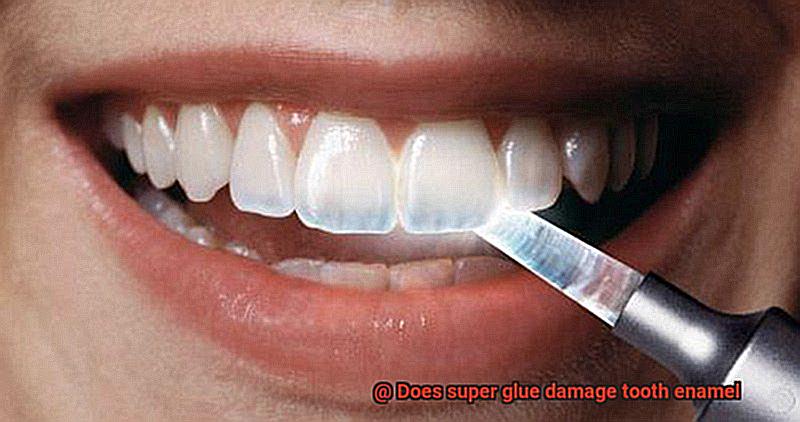
Remember, forcefully pulling or prying off the super glue from your teeth can lead to enamel damage or even tooth loss. If you’re having trouble removing the super glue yourself, seek professional dental assistance.
Once the super glue is gone, be sure to rinse your mouth thoroughly with water and gently brush your teeth using a soft-bristled toothbrush to ensure no residue remains.
Prevention is always better than trying to fix a problem. Use precautions when working with super glue, such as using protective barriers like dental dams or wax, and be mindful not to get it on your teeth in the first place.
Professional Dental Assistance for Removing Super Glue
Accidentally, getting super glue on your teeth can be a distressing situation. Panic might set in as you consider drastic measures to remove it yourself. However, seeking professional dental assistance is crucial in such cases. Dentists possess the necessary tools and expertise to safely remove the super glue without causing further damage.
Why is professional dental assistance essential? Super glue is not intended for use on teeth. If it accidentally comes into contact with tooth enamel, it can cause significant harm. Trying to remove it yourself using DIY methods like sharp objects or abrasive materials will only exacerbate the situation, leading to scratches or erosion of the enamel.
Dentists employ various techniques to remove super glue from teeth, depending on the severity of the situation. These techniques include scraping, polishing, and using specialized solvents. Professionals perform these methods with precision and care, understanding the intricacies of dental anatomy and enamel protection.
In cases where the super glue has bonded with dental restorations, such as crowns or veneers, the dentist may need to carefully remove the restoration before addressing the glue. This ensures that the restoration remains intact during the removal process. Dentists possess the knowledge and expertise required to handle such delicate situations effectively.
After successfully eliminating the super glue, dentists may recommend additional treatments or procedures to restore and protect the affected teeth. This may involve applying a protective coating or suggesting specific oral hygiene practices. Seeking professional dental assistance guarantees comprehensive care for your teeth after the removal process.
Prevention is key when it comes to avoiding accidental contact with super glue. Wearing gloves and being mindful of where you place adhesive materials can help prevent these situations from occurring in the first place.
Delaying professional dental assistance can result in more extensive and expensive procedures in the future. Seeking prompt treatment minimizes potential damage and ensures proper care for your teeth.
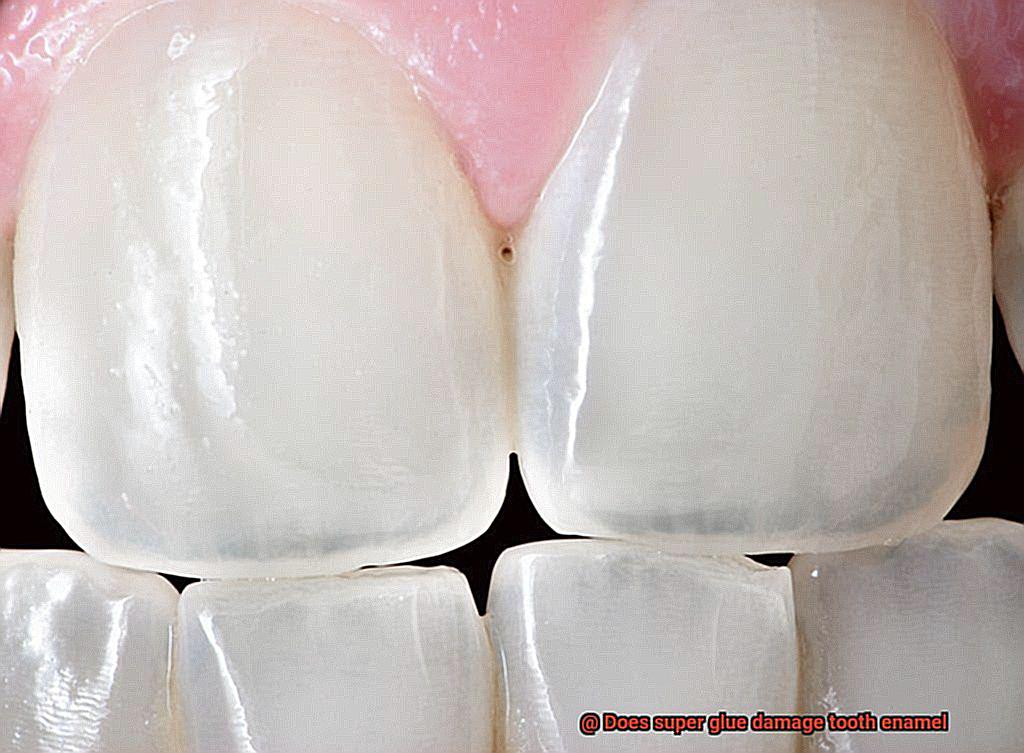
Preventing Damage to Tooth Enamel with Super Glue
We’ve all experienced dental emergencies, whether it’s a broken tooth or a loose crown. In those moments of desperation, reaching for super glue may seem like a quick fix to save the day. However, using super glue on your teeth can have serious consequences. In this article, we will delve into why it is crucial to avoid using super glue on your teeth and explore the potential damage it can cause.
The Damage:
Tooth enamel is the protective outer layer of your teeth. It shields the sensitive nerves and tissues within, acting as a barrier against decay and sensitivity. When super glue comes into contact with tooth enamel, trouble begins to brew.
The chemicals in super glue gradually wear down the enamel, leading to thinning or complete erosion over time. This weakens your teeth, making them more vulnerable to damage and decay.
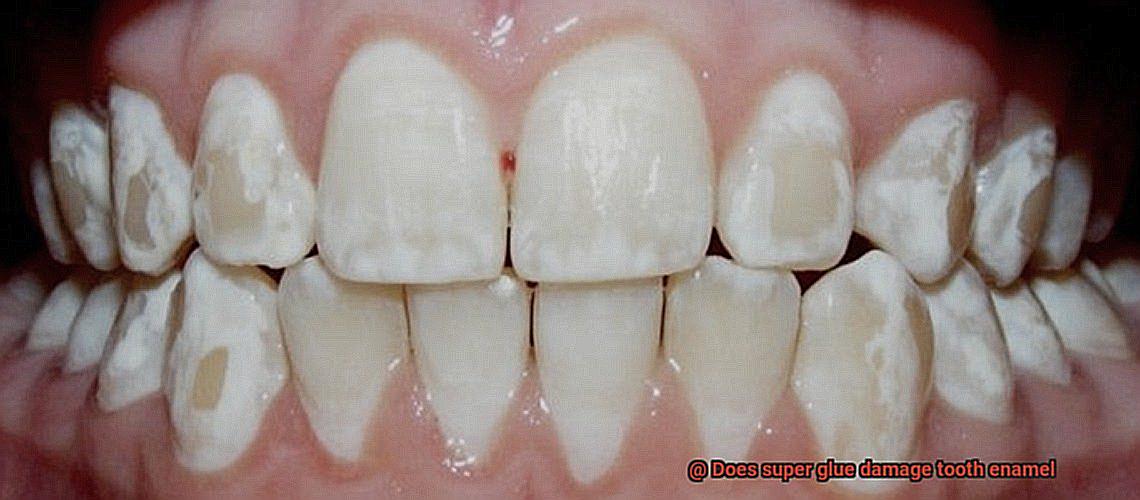
Structural Complications:
Beyond damaging tooth enamel, super glue can also cause structural complications within your mouth. Accidentally getting super glue on other teeth or surfaces in your mouth can result in them sticking together.
Separating them can lead to further damage and potential pain. Instead of risking harm, it is best to leave dental repairs to the professionals who possess the knowledge and tools required to handle such situations safely.
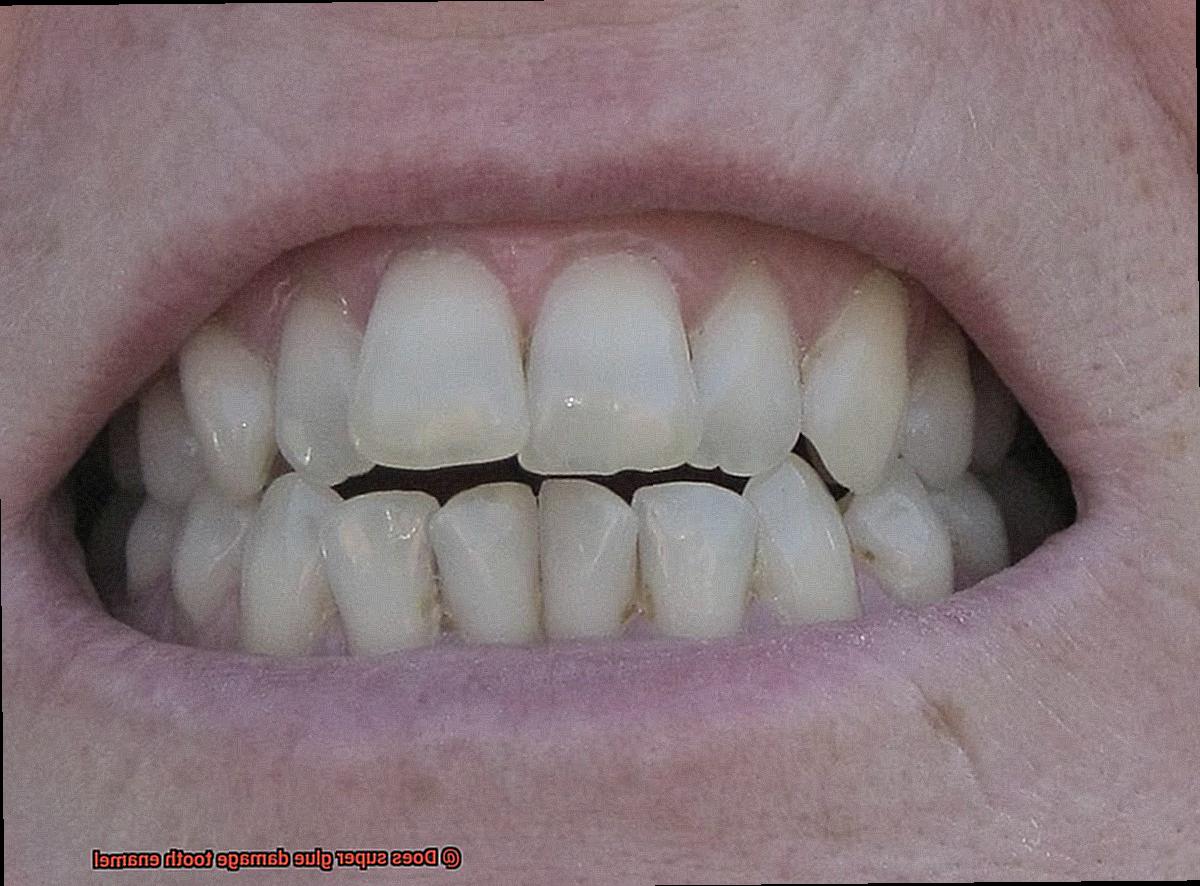
Health Risks:
Using super glue on your teeth also carries potential health risks. Super glue is not designed for use in the mouth or on soft tissues like gums and tongue. Improper application or ingestion can cause harm. The chemicals in super glue can irritate or burn the sensitive tissues in your mouth, resulting in discomfort and possible allergic reactions.
Seek Professional Help:
Rather than resorting to super glue, it is essential to consult a dental professional for appropriate treatment options. Dentists have access to specialized materials and techniques specifically designed for use in the mouth.
Whether it’s a broken tooth or a loose crown, they can assess your specific situation and recommend safe and effective solutions that preserve your tooth enamel and overall oral health.
Maintaining Oral Health:
Preventing damage to tooth enamel also involves maintaining good oral hygiene practices. Brushing your teeth twice a day with a fluoride toothpaste, flossing daily, and visiting your dentist regularly for check-ups and cleanings are essential steps in preserving strong and healthy tooth enamel.
Alternatives to Using Super Glue on Teeth and Dental Appliances
Perhaps a loose dental appliance or a wiggly tooth has left you in a state of panic. Before you resort to the tempting allure of super glue, allow me to introduce you to some safer alternatives that will save you from any mouthful of regrets.
Let’s start with the gentle touch of dental wax. This soft and pliable material acts as a comforting embrace for your teeth, providing stability and preventing further damage to your dental appliance. It’s like a cozy blanket, cradling your precious smile.
If you’re yearning for an alternative with a touch more adhesive power, look no further than dental adhesive. This specially formulated solution is designed for use within the mouth, offering a secure hold without harming your precious tooth enamel. It’s like having a trusty sidekick by your side, always ready to swoop in and save the day.
Now, for all our denture-wearing friends out there, denture adhesive is your ultimate savior. With its strong hold and effortless application and removal, no longer shall you suffer from embarrassing denture mishaps. Rejoice and bid farewell to any unwanted slips.
But let us not forget our braces-bearers. For those enduring the discomfort caused by brackets or wires rubbing against tender gums or cheeks, orthodontic wax is here to soothe the pain. Think of it as a healing balm, bringing relief to your precious smile.
However, it is important to remember that these alternatives are only temporary fixes. If you find yourself with a loose tooth or facing a more serious dental issue, it is crucial to seek professional help from your trusted dentist. They possess the knowledge and tools needed to properly assess the situation and provide appropriate treatment options.
ihe71sBAYLY” >
Also Read: What glue can I use to reattach a crown?
Conclusion
In conclusion, it is evident that super glue can indeed damage tooth enamel.
This powerful adhesive contains chemicals that have the potential to erode and weaken the protective layer of your teeth. Over time, repeated exposure to super glue can lead to irreversible damage, causing sensitivity, discoloration, and even tooth decay.
It is crucial to exercise caution when using super glue near your mouth and seek professional dental advice if you suspect any enamel damage. Remember, prevention is always better than cure when it comes to preserving your precious pearly whites.
So, think twice before resorting to super glue for any dental emergencies and opt for safer alternatives recommended by dental professionals.

